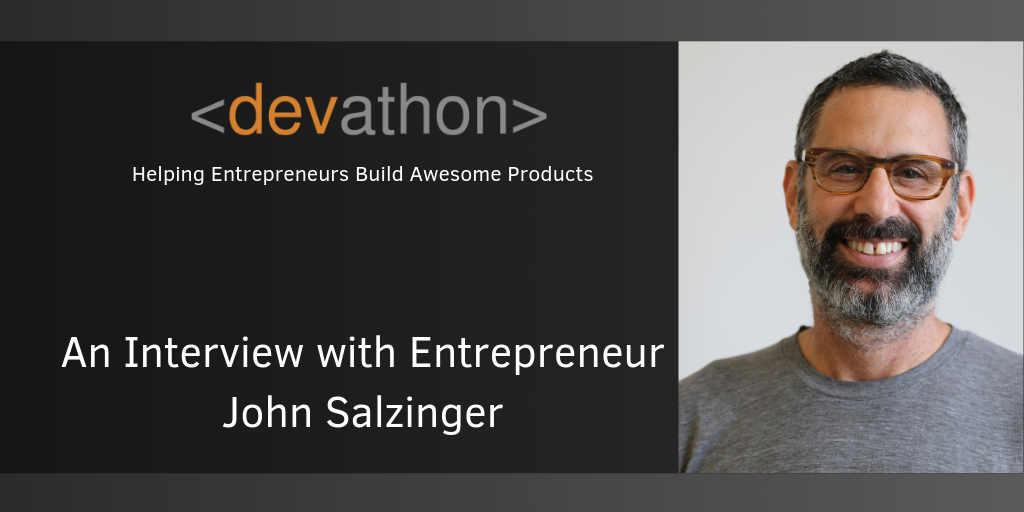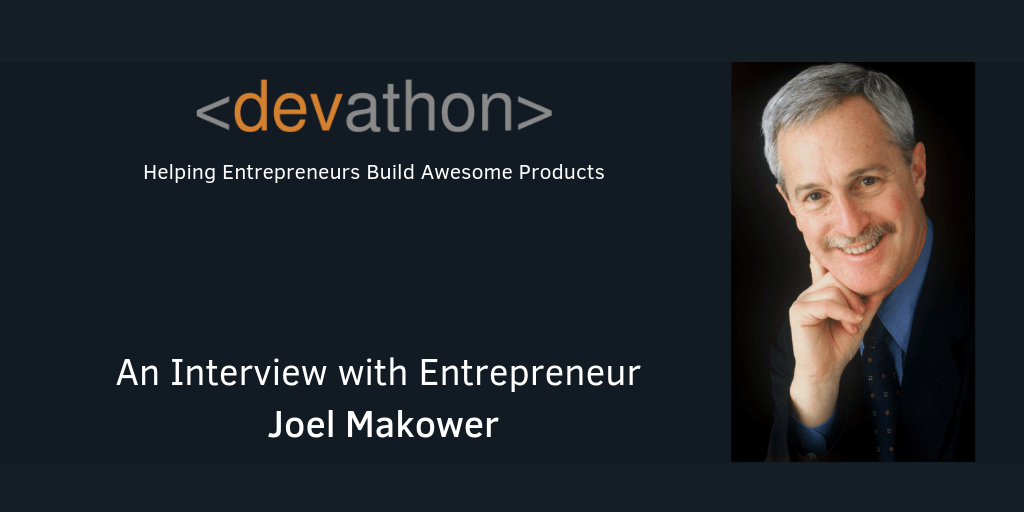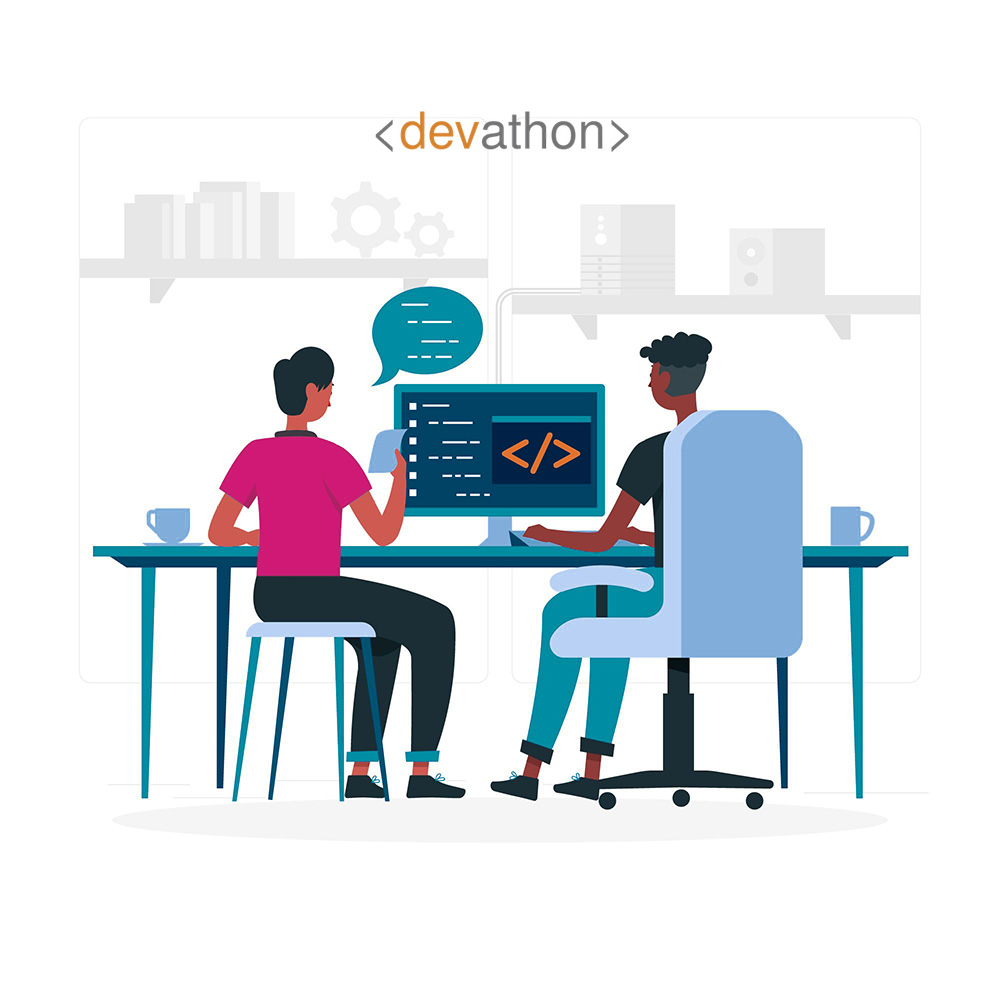An Interview with Entrepreneur David Kidder
Introduction
David S. Kidder is an entrepreneur and an angel investor in over 30 companies. He is currently the Co-founder and CEO of Bionic, which unlocks new growth and competitiveness for the world’s largest enterprises, based on the models, methods, talent, and tools of venture capital and entrepreneurship. Previously, Kidder served as the co-founder and CEO of Clickable and co-founded SmartRay Network. A graduate of the Rochester Institute of Technology, he received Ernst and Young’s Entrepreneur of the Year Award in 2008. He is the creator and co-author of the New York Times bestselling series, The Intellectual Devotional, The Startup Playbook, and new release New to Big (Currency, April 2019). He lives in Westchester County, New York, with his wife and three sons.
Are you an entrepreneur looking for your MVP built? Get in touch with us at hello@devathon.com
Devathon has built software for companies backed by the world’s leading investors like Betaworks, Greylock, Andreessen Horowitz, Accel, KPCB, Lightspeed and many more.
In an exclusive interview with Devathon, Bionic Co-Founder and CEO David traces his journey so far and his plans for the years ahead.
When did you first discover your entrepreneurial spirit and how is your entrepreneurial career developing so far?
I think I’ve always had an entrepreneurial spirit, but it has taken several forms. I’m actually not trained or educated in business; I studied design in school. My creativity has become one with my entrepreneurial inclination, because it’s helped me to design and build for what people really need, not what we think they want. That’s what good design is all about: It’s totally functional but equally as intriguing and deserving of study. At my university, I won an international design award with ID Magazine, and that was a huge validation that the way in which I saw the world and built for it was valuable to others. My book series The Intellectual Devotional and The Startup Playbook also fit into that creatively functional category. And, more personally speaking, my desire to work and grow with others is a deeply entrepreneurial trait. All of my companies have had strong cultures that emphasize united efforts, united failures, and united successes. We are constantly trying to be better versions of ourselves and create the maximum impact possible. I know that whatever comes next in my career, all of these very entrepreneurial traits–the creativity, the customer-centric obsession, and the human togetherness–will be integral.
What has been the biggest success and biggest failure stories you went through?
Oh, wow. I’ve had a lot of both. And that’s a really good thing, because we all learn and grow together. At Bionic, we’ve been a part of some pretty exciting launches, services, and products. Working with Exelon, an energy company with one of the largest power grids in the world, to create AeroLabs, a drone asset inspection startup, was a huge win and will continue to make a massive difference in that space. You can read more about it on our site. We also worked on another project with Exelon, EZ-EV, which is a resource for the underserved market of vendors of electric vehicles. Proximity, a digital proxy voting system that we worked on with Citigroup, will become even more important in our current climate. And some of the structural work that we’ve done with one of our pro-bono partners, Children’s Cancer Association, has been immensely rewarding for our team and for theirs.
I wouldn’t necessarily call these “failures,” but I would say that at Bionic, the only reason for which a partner team project hasn’t gone as hoped is a lack of CEO and C-suite commitment to the process. Without a culture of trust and full working permissions to the teams, without a willingness to allow for inevitable mistakes and to see those mistakes as learning opportunities, teams simply cannot do the work required to build the future of their company. We do insist upon that permission at the beginning of every partnership, and we try to gauge that commitment in advance, but growth can be uncomfortable for leaders who are used to corporate hierarchy and slow, expensive decision-making. It can be a process of unlearning that mentality and embracing a new way of working: the Growth Operating System that Bionic installs.
How did you come up with the idea for Bionic Solution, and how did it all start?
It’s a long story with a lot of various key figures. But basically, in 2012, my friend Beth Comstock invited me to join her keynote panel at GE’s Global Leadership meeting, as she was, at the time, the chief marketing and chief commercial officer of GE. Without planning to do so, I asked then-CEO Jeffrey Immelt, who was sitting front row center in an audience of over 700 executives, “Jeff, how many fifty-million-dollar startups did GE launch last year?” Everyone in the audience looked uncomfortable. “I bet the answer is zero,” I continued. “And if that’s true, I would be terrified if I were you. With ninety billion dollars in the bank and three hundred thousand employees, how does this not happen all the time?” The room was silent. I was pretty sure that I had forever ended my career as a thought leader. But Jeff closed the conference by saying, “That was the most important question in the history of this leadership conference.” Shortly after, I co-founded Bionic to address this very problem: Completely new, revolutionary ideas have historically felt misaligned with corporate processes, paths, and permissions. Fortune 500 companies are used to looking to metrics, consensus, and rigorous evaluation processes in their growth efforts. They don’t apply the mindsets of venture capitalism and entrepreneurship anymore. So that’s exactly what Bionic helps them do.
Tell us something about Bionic Solution.
We’re one of one. We have funny ways of reminding ourselves of this fact. Every quarter, we host a Town Hall, which is an opportunity for the entire company to get together and discuss leadership and benchmarks, host small groups around the areas in which we want to improve, give in-depth team-by-team updates, eat a lot of good food, and follow all of it up with some sort of fun recess event. And in each Town Hall, I share an image of an animal that is also “one of one,” like an animal with unique coloring that hasn’t been seen anywhere else in the world. There are a lot of consulting companies, more VCs now than ever before, and a whole slew of corporate innovation efforts underway. But who Bionic is, the type of work that we do, how we treat one another, and how we build ourselves is truly unique, and it’s important to remind ourselves of how we’re different so that we can live up to and surpass those goals that we set for ourselves. Our culture and our work are both testaments to that truth.
What are your growth plans for the near future?
We’re growing very quickly and always discovering the new customer problems that we can uniquely address–just as we advise our partners to do. Our Studio, a newer branch of Bionic, allows us to build stand-alone companies on behalf of our partners, especially when there are regulatory or channel conflicts that make it hard for them to build something themselves. And Bionic Ventures, another one of our newer structures, is a vehicle for our partners to make early-stage investments into strategic portfolios when they don’t have their own corporate venture capital arm (or when they want to invest in earlier stages than their CVC is set up to do). But honestly, five years is a long time from now. A lot can change in the markets, business models, and technologies. Check in again in 2024!
Looking back, what did you learn and what would you have done differently?
Everything is an ongoing process for me and for Bionic. I wouldn’t say that I believe in a desire to go back in time and change decisions that I’ve made. I’m immensely proud of and happy with the work that Bionic has done with our partners. We have worked with some of the largest and most creative companies in the world, from Nike, to Microsoft, to Citi, to Exelon, to P&G, to TD Ameritrade, and many more. We’re improving our Growth OS (operating system) every day. We’re growing together with our partners. We’re learning about what works, what could be better, and where we’re going as a company and as individuals.
In your opinion, what are the hurdles that keep people away from starting an entrepreneurial career? What advice would you give to new entrepreneurs?
I think it’s a common misconception that only startups can be entrepreneurial. That’s just not true. Of course, large companies unintentionally squash entrepreneurial tendencies by promoting the “follower” mentality and the corporate hierarchy, all while failing to encourage out-of-the-box thinking. But anyone is able to change company culture and trajectory, even if you start small. Taking risks and raising your hand when you disagree with the consensus is scary, but you don’t have to leave your position to do it.
If you do want to branch out and start a company on your own, though, I would say a few things. First, be obsessed with the problem, not the solution. Ideas are a dime a dozen. Care deeply about your customer’s problem. If you don’t care about it, you’re not the right person to solve it. Secondly, test, test, and test. There is always so much that you don’t know. Test at every stage. Thirdly, and this is not emphasized enough in startups, prioritize building your team members as employees and as people. Everyone you hire should be hungry for self-improvement as well as for improving the lives of your partners and customers. And, while there are many other pieces of advice that I could give, it’s most critical to build yourself through this process. Companies can and likely will fail. Team members will come and go. But if you don’t take every opportunity to be more gracious, more passionate, and more introspective, what’s the point of doing it at all?
Are you an entrepreneur looking for your MVP built? Get in touch with us at hello@devathon.com
Devathon has built software for companies backed by the world’s leading investors like Betaworks, Greylock, Andreessen Horowitz, Accel, KPCB, Lightspeed and many more.




